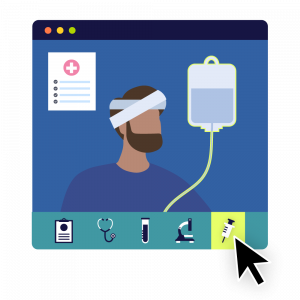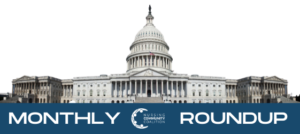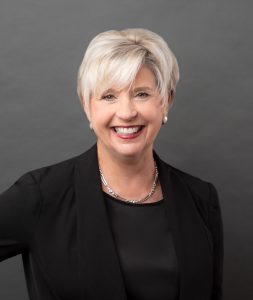As an organizational affiliate (OA) of the American Nurses Association (ANA), OADN applauds the newly formed ANA National Commission on Racism in Nursing. As the organization that represents the associate degree nursing (ADN), this pathway allows for a diverse spectrum of students, enriching the profession, and meeting the health care needs of patients, families, and communities. OADN’s Chief Executive Officer Donna Meyer who is a member of the Commission stated, “I am honored to part of this Commission as we focus on this extremely important national discussion. We know that at a diverse balance in the nursing workforce improves health outcomes, supports vulnerable populations, and increases the wellbeing of communities. I look forward to this work as we have honest and bold discussions with needed action steps to address racism in nursing.”
Full Press Release:
(January 25, 2021) – Leading nursing organizations convened for the inaugural meeting to launch the National Commission to Address Racism in Nursing (the Commission). The Commission will examine the issue of racism within nursing nationwide and describe the impact on nurses, patients, communities, and health care systems to motivate all nurses to confront systemic racism.
The Commission is being led by the American Nurses Association (ANA), National Black Nurses Association (NBNA), National Coalition of Ethnic Minority Nurse Associations (NCEMNA), and National Association of Hispanic Nurses (NAHN). The Commission members and organizations represent a broad continuum of nursing practice, ethnically diverse groups, and regions across the country:
| Member Organizations of the National Commission to Address Racism in Nursing |
| American Academy of Nursing |
Minority Fellowship Program at the American Nurses Association |
| American Association of Colleges of Nursing |
National Alaska/Native American Indian Nurses Association |
| American Nurses Credentialing Center |
National Association of Licensed Practical Nurses |
| American Nurses Foundation |
National League for Nursing |
| American Organization for Nursing Leadership |
Ohio Nurses Association |
| ANA-Massachusetts |
Oregon Nurses Association |
| Asian American/Pacific Islander Nurses Association |
Organization for Associate Degree Nursing |
| American Association for Men in Nursing |
Philippine Nurses Association of America |
| Chi Eta Phi |
The Minority Nurse |
| Florida Nurses Association |
|
The Commission aims to lead a national discussion by exploring the experiences of nurses of color to understand the impact of systemic racism and to develop an action-oriented approach across the spectrum of education, practice, policy, and research.
“Racist attitudes, bias, stereotypes, and behaviors against nurses and nursing students of color have absolutely no place in nursing and are a direct contradiction to the core values and the Code of Ethics for Nurses,” said American Nurses Association President Ernest J. Grant, PhD, RN, FAAN. “We know that the issue of racism in nursing is a persistent stain on our profession that directly impacts the quality of care for the patients and communities that we serve. Through this important and long overdue work, we can truly begin to describe and to understand what racism looks like within nursing as a starting point towards progress to meaningful changes. I am confident that this Commission is the right group to do this because of the diverse perspectives and – most importantly – the lived experiences that we all bring to the table.”
National Black Nurses Association President and CEO Martha A. Dawson, DNP, RN, FACHE stated that the nursing profession is like larger society when it comes to injustices.
“The profession of nursing has a long history of institutional inequities, classism, and racism as evidenced by the low percentage of non-White nurses and less than 1% of the deans and chief nursing officers coming from diverse backgrounds. As prolific researchers and writers, nurses discuss diversity, healthy work environments, anti-bullying, interprofessional collaboration, patient-centered care, and inclusivity, but where are the scope and standards of practice against racism,” said National Black Nurses Association President and CEO Martha A. Dawson, DNP, RN, FACHE. “Change starts with leadership and too many of our nurse leaders are uncomfortable with open dialogue about racism, sexism, and classism which means they have to examine their own practices and commit to healing and leading differently. For too long, our profession has treated racism as a small, localized abnormality when it is an open wound. Nurses know that a sterile bandage will not remove infection. In 2020, the Year of the Nurse, COVID-19 pandemic, social injustices and unrest, and the recent assault on the U.S. Capitol all point to one defining moment and that is change must come. Nursing has the opportunity to look in, lean in, and change our profession. It is not enough to be the most “trusted”; we must become true healers and heal ourselves. This National Commission is committed to real change.”
The National Coalition of Ethnic Minority Nurse Associations President Debra A. Toney, PhD, RN, FAAN, said her organization is the unified nursing voice for ethnic minority nurses across the globe.
“We have observed our own health care professionals and frontline nurses bravely battle COVID-19 for months. Many have lost their lives and others continue to risk their health. Now the exponential effects of racist behavior as expressed by people who are supposed to protect lives, and allow for the enjoyment of a democratic society, have rattled the very foundation of a humane society,” said President of NCEMNA Debra A. Toney, PhD, RN, FAAN. “Our country is in a state of turmoil and an unending crisis that contributes to our long term physical and mental health. Immigrants are detained and their children kidnapped, Asian Americans are attacked and blamed for the coronavirus, Native American women are kidnapped or murdered and their perpetrators are never brought to justice, and people of color are not protected by the laws of this land. As nurses, we call on all health care professionals to declare a state of public health emergency to address these social ills and move this country toward true equality. NCEMNA stands in solidarity with those seeking justice, equity, and peace for all people. As nurses, we promote the celebration of diversity, understanding, compassion, and equality for all. We challenge the nursing profession to make changes at all levels in education, practice, research, and policy to break down structural racism and discrimination.”
“Racism within nursing has left lasting impacts on generations of nurses and continues to manifest as structural, institutional, systemic, and interpersonal racism in nursing and our society,” said National Association of Hispanic Nurses Policy and Advocacy Committee Member Daniela Vargas, MSN, MPH, MA-Bioethics, RN, PHN. “The nursing profession for decades has attempted to launch and support efforts around “diversity,” “equity,” and “inclusion,” but these initiatives make slow progress and do not specifically address the racism and racist policies that are steeped in the nursing profession. This inaction directly affects nurses of color, primarily Black, Brown, and Indigenous nurses and creates barriers for entering, practicing, and pursuing leadership and research roles within the nursing profession. In addition, this Commission must address various forms of how racism manifests including colorism, microaggressions, white supremacy or white pathology, white dominant culture, and white privilege as well as how racism directly reveals itself as anti-Black and anti-Indigenous within all ethnic groups. There must be a centering of the lived experiences of nurses of color, especially Black, Brown, and Indigenous nurses, who historically have not had the opportunity to have their voices or lived experiences around racism acknowledged and affirmed. With 2020 and 2021 being the Year of the Nurse and Midwife, we must hold our profession accountable for its role in racism and racist policies to purposefully work towards educating nurses to be antiracist and promote antiracist policies within nursing.”
Racism is a public health crisis that impacts a person’s mental, spiritual, and physical health as well as overall quality of life. Racism in the nursing profession does not align with The Code of Ethics for Nurses with Interpretive Statements, which obligates all nurses to be allies and to advocate for and speak up against racism, discrimination, and injustice. Nurses of color are often subjected to unfair structural and systemic workplace practices, processes inherent in many health care systems, hospitals, and care settings that must be identified, addressed, and eradicated. In addition to longstanding experiences with racist attitudes and behaviors in the workplace, nurses of color are not exempt from the longstanding disparities and inequities in health care or feeling the brunt of the persistent COVID-19 pandemic. A survey of more than 10,000 nurses conducted in July of 2020 by the American Nurses Foundation, found that Black and Hispanic/Latino nurses were more likely to be in roles providing direct care to COVID-19 patients than White nurses (58% and 63% vs. 49%), and twice as likely to have been diagnosed with COVID-19 (10% and 11% vs. 5%).
The Commission will meet monthly to explore and understand the issues of systemic racism within nursing through varied insights and perspectives to include subject matter experts and scholars on the issue. Later this year, the Commission will host a virtual summit focused on activism and publish findings and a set of priority recommendations to address racism in nursing.
###
The American Nurses Association (ANA) is the premier organization representing the interests of the nation’s 4.2 million registered nurses. ANA advances the profession by fostering high standards of nursing practice, promoting a safe and ethical work environment, bolstering the health and wellness of nurses, and advocating on health care issues that affect nurses and the public. ANA is at the forefront of improving the quality of health care for all. For more information, visit www.nursingworld.org.
The National Association of Hispanic Nurses (NAHN) is actively involved in issues affecting Hispanic nurses and the health of Hispanic communities on local, state, regional and national levels. The organization is committed to providing equal access to education, professional and economic opportunities for Hispanic nurses and towards improving the health and nursing care for Hispanic consumers.
Founded in 1971, the National Black Nurses Association (NBNA) is a professional organization representing 308,000 African American registered nurses, licensed vocational/practical nurses, and nursing students in 108 chapters and 34 states. The NBNA mission is “to serve as the voice for Black nurses and diverse populations ensuring equal access to professional development, promoting educational opportunities and improving health.” NBNA chapters offer voluntary hours providing health education and screenings to community residents in collaboration with community-based partners, including faith-based organizations, civic, fraternal, hospitals, and schools of nursing. For more information, visit nbna.org. #NBNAResilient ###
The National Coalition of Ethnic Minority Nurse Associations (NCEMNA) is a coalition of five national nursing organizations that represent diverse communities. Our members include the Asian American/ Pacific Islander Nurses Association (AAPINA), National Association of Hispanic Nurses (NAHN), National Alaska/Native American Indian Nurses Association (NANAINA), National Black Nurses Association (NBNA), and the Philippine Nurses Association of America (PNAA).


 Due to COVID-19 the 2021 NIWI will be held in a virtual format. Mark your calendars for April 19-22, 2021!
Due to COVID-19 the 2021 NIWI will be held in a virtual format. Mark your calendars for April 19-22, 2021!
 Dr. David Woodruff, a Faculty Development Specialist with Chamberlain University, was previously the Dean of Academic Affairs at the Cleveland, Ohio Campus. Dr. Woodruff has 30 years of experience in the nursing profession including practicing in Intensive Care and teaching in ADN, BSN, and MSN programs. Prior to coming to Chamberlain, Dr. Woodruff was the founder and president of a business that specialized in personalized continuing education and coaching to increase the number of certified nurses in the workforce. Dr. Woodruff earned his BSN and MSN from Kent State University, and a PhD in Nursing Education from Capella University. Dr. Woodruff is a National Academies of Practice fellow, Certified Nurse Educator, and is certified in Professional Staff Development, Critical Care nursing and Progressive Care nursing. His dissertation and research interests include the transition to practice and professional development of nurses and faculty. Dr. Woodruff serves as the Associate Editor for the Teaching and Learning in Nursing journal.
Dr. David Woodruff, a Faculty Development Specialist with Chamberlain University, was previously the Dean of Academic Affairs at the Cleveland, Ohio Campus. Dr. Woodruff has 30 years of experience in the nursing profession including practicing in Intensive Care and teaching in ADN, BSN, and MSN programs. Prior to coming to Chamberlain, Dr. Woodruff was the founder and president of a business that specialized in personalized continuing education and coaching to increase the number of certified nurses in the workforce. Dr. Woodruff earned his BSN and MSN from Kent State University, and a PhD in Nursing Education from Capella University. Dr. Woodruff is a National Academies of Practice fellow, Certified Nurse Educator, and is certified in Professional Staff Development, Critical Care nursing and Progressive Care nursing. His dissertation and research interests include the transition to practice and professional development of nurses and faculty. Dr. Woodruff serves as the Associate Editor for the Teaching and Learning in Nursing journal.
 Dear OADN Members:
Dear OADN Members: